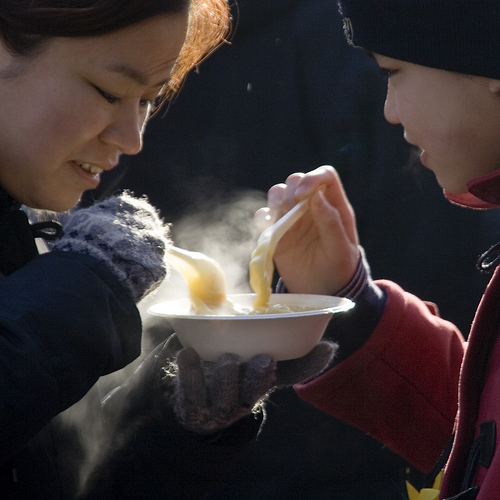You don’t have to delay gratification or help other people to be human. Not delaying gratification can lead to a lot of suffering, and not helping others can lead to loneliness and insecurity, but they’re not strictly necessary.
To some extent, though, the better we are at delaying gratification and helping others out, the more we start experiencing benefits out of the blue. Being a dependable and altruistic member of a community creates a network of people who are willing to do things for us, look out for our interests, lend us assistance when we most need it, and support us when we’re recovering from a loss or setback. Handling our own desires intelligently has a similar effect: we continue to reap benefits from things we’ve done in the past.
Yet both helping others and delaying gratification pose a problem: we have to give things up now with a chance that we won’t be paid back. For instance, if I have a box of fudge and I hold off on eating some or all of it, I have to give up the experience of eating the fudge right now and run the risk of someone else eating the fudge, of losing it, of it going bad, etc. The surest way to get all of the “benefit” from eating the fudge is to consume all of it, right away.
The problem with that approach is that taking everything you can get the moment you have it often leads to a cornucopia of troubles. In the case of the fudge, eating a lot of it at once can make a person sick, contribute to unwanted weight gain, create an unpleasant sugar rush and crash, and cause the person to look like a pig to onlookers. To eat all of the fudge, I don’t have to give anything up, but in the end I bring on suffering and fail to experience the same kind of satisfaction I’d get from managing the fudge over time.
In a similar way, if I have a pound of fudge and some people I could share it with, the surest way to get all of the “benefit” of the pleasure of eating the fudge is to eat it myself, whether I do that now or later. Yet sharing the fudge with others makes others more likely to share with me, and over time is likely to yield a variety of benefits that a pound of fudge alone could not confer—especially if I don’t want to eat a whole pound of fudge.
Evolving as individuals, becoming more enlightened and compassionate, and learning how to handle ourselves better therefore means a lot of saying “I’m going to give up on this pleasure I could get right at the moment” and “I’m going to give up on this surer thing for this more uncertain thing.” It’s counterintuitive, and to a large extent we’re not built for it, and yet our lives become much happier the more we learn to defer and share. We can’t experience the pleasure our future selves will experience when we set things by for them now, or directly experience the pleasure others feel when we do things on their behalf. Fortunately, we can experience the immediate goodwill we call forth when we do things for other people and the satisfaction we get from making good choices. While these things don’t give us the immediate animal response we’d get from eating a pound of fudge, they also tend to make us feel healthier, happier, and in better harmony with our lives and environments–rather than making us sick.
If you’re interested in this topic, you may enjoy reading my article “The Difference Between Pleasure and Happiness.”
Photo by Xiangdian



